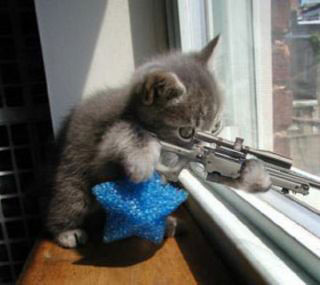Among Other Unfortunate Results, Bong Hits Also Have the Power to Erode the First Amendment.
This week, the United States Supreme Court ruled that suspending a high school senior for holding up a "Bong Hits 4 Jesus" sign at a school-sponsored function was not a violation of the kid's First Amendment rights. The case was Morse v. Frederick.
In 1969, students wore black armbands to school protesting the Vietnam War. In Tinker v. Des Moines Indep. Comm. Sch. Dist., the Supreme Court held that punishing these students based on some generalized fear that school disruption would occur was simply not enough of a reason to deny the kids their First Amendment rights.
The difference between that case and the Frederick case makes the outcome of the Frederick case that much more astounding. The black armbands actually were intended to convey a message; they made a statement by those who wore them. As Justice Abe Fortas noted in Tinker, the armbands were banned "based upon an urgent wish to avoid the controversy which might result from the expression, even by the silent symbol of armbands, of opposition to this Nation's part in the conflagration in Vietnam." Translation: The school board wanted to avoid the awkwardness and discomfort from having people openly debate whether the Vietnam War was a Good Idea.
The sign in Frederick is more vague: "Bong Hits 4 Jesus." True, it doesn't really stimulate a hell of a lot of discussion about the "hot topic" of drugs and drug laws.
Really, the school in Alaska just wildly overreacted to a stupid gag. Kids do that. And under Tinker, the school's generalized fear that its event would be disrupted by the sign is not enough for the school to ban the sign altogether.
But now, the Supreme Court has changed that landscape, and in a markedly broad way. The sweeping language of the decision suggests that a school may discipline students for speech which "they reasonably regard as promoting illegal drug use." The problem: On its face, the sign doesn't "promote" using illegal drugs. It's meant to be funny. Lots of people make reference to bong hits even if they don't use drugs. Should a kid be punished for saying in school "Are you on crack?" to a friend who just said something remarkably stupid?
Worse yet, the standard vests that determination purely in the hands of the school board. If they just say "I reasonably believed it promoted drug use," that's the end of the analysis, and they have a right to censor the kid. Where's the checks-and-balances on this? Shouldn't someone else -- i.e., an objective reasonable person -- have to agree with this assessment?
This case turns First Amendment jurisprudence on its head. Really serious speech -- like expressions meant to protest the Vietnam War -- are protected. But silly, frivolous speech -- like a sign linking marijuana use to Jesus -- is not protected. One would have thought that Tinker set a floor for First Amendment protection: everything up to an including the really serious stuff is protected. Not so, this Court says. The super-serious stuff is protected, but if it's not so serious (maybe semi-serious?) watch out. You could get nabbed.
This ruling is a huge setback to the free speech rights of students and represents just why this country messed up big time when it "elected" W. to the White House. Twice, no less.
Oh, and one last bit of food for thought: What would the conservative justices who voted in the majority in this case have done if a kid had been disciplined for holding up a sign that said "Abortion is Murder"? I submit to you that, strangely, that kid would have had the full backing of the First Amendment behind him.


1 comment:
Ah, but what would the Wise Nine have said if the sign said: "Abortion and Tuna Casserole"?
Post a Comment